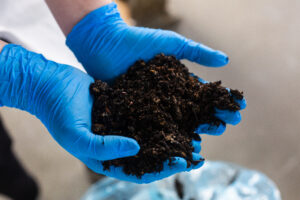Forbes Agtech Event – A view on the Future of Food from Main Street Salinas
Recently, I attended Forbes Agtech Event in Salinas and joined over 500 entrepreneurs, investors, farmers, and others to take a look at the next wave of agtech innovation. There were several underlying trends that stood out for me after I spoke to entrepreneurs to learn more about innovation in automation, food safety, supply chain complexity, and of course … water. Last but not least were solutions enhancing nature’s most efficient pollinators: bees.
Automation
Even with 90% of large farm machinery having some amount of self-driving capabilities, there is still the need for a human operator in each one. Bear Flag Robotics are developing a remote operating system where one operator can control multiple machines, as well as plan jobs and optimize routing. Root AI were also attending, explaining the tomato machine vision and picking robot it is developing for indoor agriculture.
Labor shortages are still a major concern; a weed spraying robot from Tensorfield Agriculture was offering one solution. It was sold as a replacement for a 40-person weeding team. With one operator, the robot itself uses machine vision to detect weeds among crop plants and sprays targeted hot canola oil on the weed to kill it.
Alesca Life, a developer of indoor farming systems, were keen to stress their focus on China as a key market. Their CEO Stuart Oda explained that they are looking to roll out their growing system at over 1000 locations in China with an unnamed partner, as well as looking to expand into Dubai and South Africa. Stuart emphasized the importance of speed to stay ahead of competitors deploying systems through build own operate or licensing to be able to roll out updates, staying ahead of competitors. Alesca Life received World Economic Forum Technology Pioneer Award 2019.
Food safety
As I covered in January, the rise of pathogen outbreaks in the global food system has been a growing problem with the industry looking for a solution that can provide lower false positive testing while reducing the testing delay from 2-4 days to within 24 hours. ProteoSense CEO Mark Byrne, explained how their proprietary pathogen detection kit can be performed by anyone, deliver a test result in minutes as opposed to days, detect a number of pathogens and claim the ability to differentiate between live and dead pathogens. The company, in trials, provides a dock and test cartridge set-up . They will look to raise Series A towards the end of the year. Clear Labs, does a full genetic fingerprint, which provides greater data about the sample, but cannot differentiate between live and dead pathogens. This may lead to greater false positives if applied after the kill step.

Complex supply chains
CJ Buxman, of Fruitworld, is a fruit grower. His major issue was time spent on the phone conveying information in the supply chain, such as explaining why a shipment wasn’t ready, why a driver is late, or talking with the buyer about what fruit is available. While he agreed that solutions such as iTradeNetwork increased communication and transparency in the invoicing process, it does not solve red tape challenges.
The Secretary for Agriculture, Sonny Perdue, noticed that while a chicken egg was regulated by the USDA when cracked it fell into the jurisdiction of the FDA, when turned into a food commodity such as a cheese pizza it was back under regulation from the USDA, but if you put a potentially pathogen-carrying topping on, such as pepperoni, it was the FDA regulatory responsibility.
CJ and Sonny’s accounts are a reflection of the ‘messy middle’ of the food chain. Two innovations I saw directly targeting this problem were Kiptraq and HeavyConnect. Kiptraq offers compliance processes and workflow optimisation using mobile data collection to help food chain operators manage processes and tasks in efficient, clean, and accurate ways. HeavyConnect is more targeted at ensuring food safety, geo-tracking produce and food handling processes to offer instant corrective actions and product traceability.
Water
Considering the droughts experienced across California from 2016-2018, it was unsurprising to see water technologies in abundance at the event. Those present covered the value chain in agricultural water use and disposal.
In California, 67% of irrigation water and 51% of drinking water is drawn from groundwater. Wellntel is a developer of groundwater sensing and data science technology that can create a heat map view of groundwater from well owners to counties and multiple states, giving better information about groundwater levels to improve management of this resource across multiple stakeholders.
On the farm, Swiim offers water budgeting software to provide field- and crop-level actionable insight drawing on sensors, telemetry and satellite data. With over ten years of data, the company not only offers water delivery and consumption reports but has expanded to offer crop-specific advice on watering practices. Where Swiim may be more advanced with water accounting software and insights for the farm, sensor technology such as Groguru’s soil moisture and salinity measurements are offering increasingly granular and accurate insight into how and when a plant is taking in water in order to optimise irrigation practices.
Finally, and in contrast the crop-orientated solutions that dominated the event, there was Livestock Water Recycling. The company saw that a 2,500 head dairy typically spent $700,000 a year moving manure around, often into large manure pools. Their manure treatment system instead takes macro and micronutrients out of the manure, separating it into fertilizers and purified, potable, water. The system was not only cheaper than existing manure handling practices, but also increased the farm’s crop yields. This ‘entremanurial’ idea won them the top prize in the THRIVE pitching competition on the first day of the event.
Keep an eye out for…Bees
Pollination is big business. Between $235 and $577 billion of annual global food production relies on the direct contribution of pollinators. Honey bees contribute $20 billion to the value of US crop production. In the EU we have seen pesticides such as neonicotinoids banned in part due to the poisonous effects in bees, and a likely contributor to growing instances of Colony Collapse Disorder. To combat this, these start-ups were at the event to offer a solution:
- ApisProtect, a developer of technology to help beekeepers prevent losses and increase hive productivity.
- The Bee Corp, winner of the THRIVE Sustainability Award, is a developer of software and data analytics for real-time hive monitoring and activity diagnostics for commercial beekeepers.
- Olombria, a developer of more efficient pollinators by using volatile chemical compounds to manage pollinating fly species to increase crop productivity.



